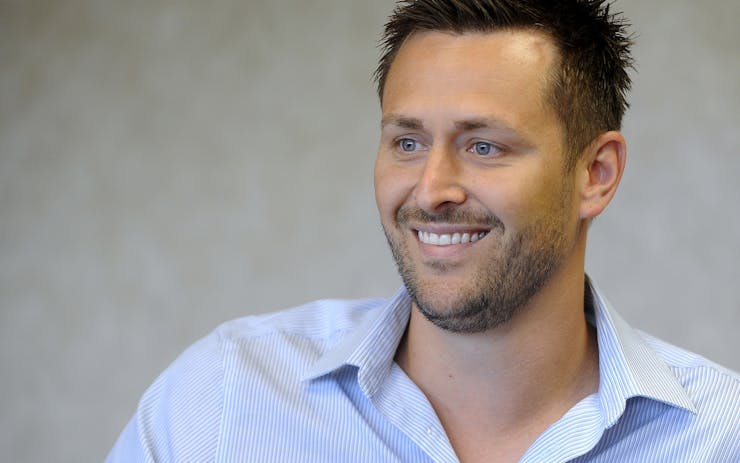Cannabis consultant Eric Hagen was acquitted on all charges on Wednesday afternoon, as his dramatic trial in Flandreau, South Dakota, came to a close. The case, which has major ramifications for the cannabis industry, pitted South Dakota prosecutors against Hagen, a Colorado cannabis consultant who had worked on one of the nation’s first tribal cannabis developments with the Flandreau Santee Sioux tribe.
It took the jury just over two hours to find Hagen not guilty on three counts. The CEO of Monarch America was cleared of any wrongdoing in connection with the tribe’s proposed cannabis resort located a couple miles from the Moody County Courthouse.
'The state has to realize the tribe is a sovereign nation.'
State prosecutors tried to portray Hagen as a marijuana mastermind who used naive tribal members to grow illegal cannabis. But Hagen’s defense attorney portrayed the charges as a case of judicial overreach—and a political move on the part of South Dakota Attorney General Marty Jackley, who is considered a leading candidate for governor.
Hagen, who now lives in Sioux Falls, South Dakota, said he was happy with the verdict but knows there is still a lot to be sorted out in terms of tribal sovereignty and cannabis policy.
“I’d just like to say I’m happy with the outcome,” Hagen said in a post-trial press conference at the Royal River Casino, which is owned by the Flandreau Santee Sioux tribe. “The state now has to realize that the tribe is a sovereign nation and they can’t overstep their jurisdictional boundaries just because they don’t like something.”
It was Jackley vs. the Tribe
For Hagen, the motivation in this case was simple: This was about the political motivations of South Dakota Attorney General Marty Jackley. Hagen still serves as president and CEO of the cannabis consulting firm Monarch America, but he said his company lost all contracts, as well as its $80 million valuation, after his indictment. At the news conference Hagen blamed Jackley for sending a message at the expense of both his own business as well as the tribe’s.
“He tanked our company by spreading lies and rumors, and it’s upsetting,” Hagen said. “Frankly, I think Marty got his feelings hurt, because there was a meeting I set up with Marty that I had to cancel… When I cancelled that meeting with Marty, he threw a temper tantrum.”
“It was 100 percent politically motivated. Marty (is) running for governor.”
Drama of the Final Day
The day started off with closing arguments before the 12-member jury. Deputy Attorney General Bridget Mayer, who prosecuted the case, tried to reinforce her portrait of Hagen as the person in control of the tribe’s cannabis grow operation. Mayer repeatedly took on the ‘role’ of Hagen, whispering to the jury at times and then dramatically rattling her hand against the prosecution’s table to emphasize her point.
Mayer portrayed Hagen as a puppet master who attempted to run an illegal clandestine grow on tribal lands.
“He told the agents all about marijuana, he knows all about marijuana, he’s been in the industry for eight years,” Mayer said.
Prosecutor: Hagen-Hunt Conspiracy
Mayer then turned to the evidence in the case. She highlighted the testimony of Jonathan Hunt, Hagen’s former business partner and a non-indicted co-conspirator in the case. Hunt was in control of the crop, Mayer contended, and because of his close relationship with Hagen, there was no doubt in her mind that a conspiracy took place. Mayer also detailed six acts she claimed were “overt acts” that proved the conspiracy, which included the selection of the “GSC (f.k.a Girl Scout Cookies)” and “Trainwreck” strains as part of the seed library.
'Marty Jackley tanked our company by spreading lies and rumors.'
Because of Hagen’s role in the operation, Mayer asked the jury to return a guilty verdict on all three charges. Mayer argued that Hagen’s role in spearheading the project proved he was guilty of violating the state’s cannabis laws.
“We need to get that pot going, and we need to get it going now,” said Mayer, as she play-acted Hagen’s role in procuring seeds.
Defense: Jackley’s Political Motives
Once Mayer wrapped up, it didn’t take long for defense attorney Mike Butler paint a much different story. Butler compared the prosecution’s case to a movie version of a book that took too many liberties with the story. Due to those liberties, Butler argued, the jury should look beyond Mayer’s claims and realize that the case was more about power and political disputes, and less concerned with the law.
“This case is not a case of being stopped on the interstate, although they are trying to make it sound that simple,” Butler said. “If it’s so clear as they are going to say now… Beyond a reasonable doubt, how come it wasn’t clear to them [then], but now it is?”
According to Butler, neither Hagen nor Hunt were ever warned that consulting on the project was illegal. Butler shot down the prosecution’s assertion that any attempt to get surveillance footage from the facility would be a “fruitless venture,” according to Mayer, and further asserted that the case was never being investigated as a drug case.
Had it ever been communicated to Hagen or Hunt that there was a question of legality, Butler said, both men testified they would have been “on the first plane” out of town.
“Nobody wanted that fight. You saw Mr. Hunt. You think he wanted that fight?” Butler said. “If you were in the process of committing criminal acts—conspiracy—are you going to say to a law enforcement agent, ‘Come on it, look around, I’ll answer any questions you’ve got?’”
Where’s Marty Now?
Butler also pulled no punches with his assertion that the case came down to a power dispute between South Dakota Attorney General Marty Jackley and the Flandreau Santee Sioux’s tribal sovereignty. Had it been within the state’s power to seize the plants when law enforcement visited the facility, Butler said, Jackley should have instructed them to do so, and charged Hagen and Hunt at that time. But Jackley declined, and then waited nine months after the crop was destroyed to make his next move.
'This is a political power dispute, not a drug case.'
“This was a political dispute, not a drug case,” said Butler. “This is a power dispute, not a drug case. And my client, and Mr. Hunt, are collateral damage. That’s what they are, in a fight between two other people in a battle over jurisdiction.”
And after Jackley “stood right there” and announced the indictment to “great fanfare” in this same courtroom, Butler said, the defense attorney questioned Jackley’s lack of involvement in the case and his absence from the witness list. Now that the trial was underway, Butler pointed out, Jackley “is nowhere to be found.”
Tribe Seeks Federal Clarification
Flandreau Santee Sioux tribal president Tony Reider, who joined Hagen at the press conference, said that while he was happy with the outcome, this case clearly illustrated the need for a continued dialogue about the future of cannabis in Indian Country.
'We were trying to proceed with caution.'
“There is an underlying battle within this case that is something the tribe looks forward to trying to get some clarification on,” Reider said. “Some jurisdictional issues. We’ve discussed (restarting the project), but we want to see more clarification on the federal level. We don’t want a repeat of what happened. We’re not here, and we were never here, to be first and to be stubborn with the project. We were trying to proceed with caution.”
“We want to be right, and we wanted to generate some income to take care of some shortfalls that the federal government has been unable to provide with treaty applications. And that was always our ultimate goal.”





